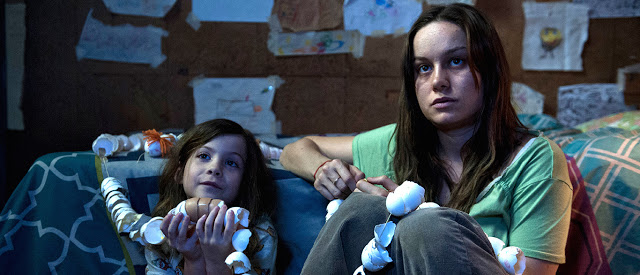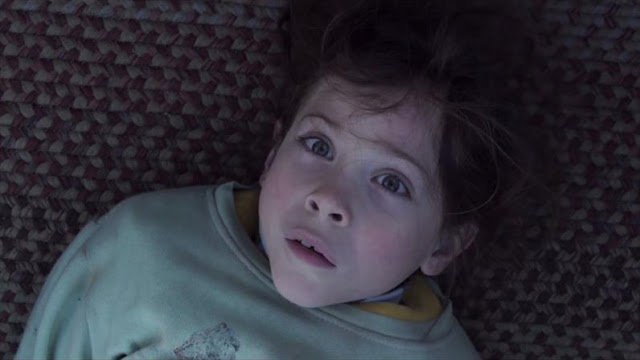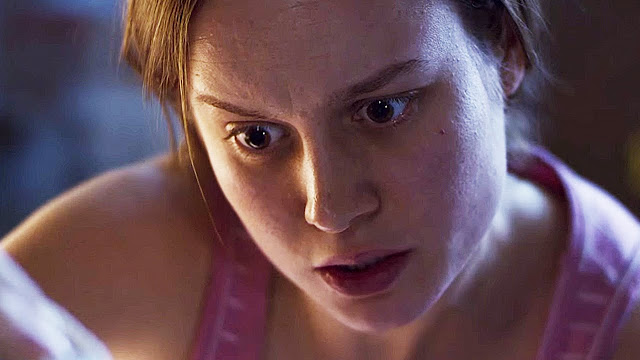The boy lives with his Ma in Room. Not the room, not a room—just Room. To preface the proper noun with an article is to suggest the possibility of other rooms, different rooms. But there is only Room: Four walls, a ceiling with Skylight, and beyond that Outer Space and Heaven. That is all there is. That is the world.
A harrowing, heartbreaking drama from Lenny Abrahamson, Room is a film of many virtues—superlative acting, tender writing, enormous feeling—but its greatest achievement is immersing its audience into the boy’s state of mind, articulating how he perceives this tiny, cloistered space that is his entire universe. The screenplay is by Emma Donoghue, adapting her novel, which she wrote from the perspective of the boy, named Jack (portrayed on screen by Jacob Tremblay, in an astonishing performance). Her script is a model of economy and minimalism; she supplies Jack with a few quick voiceovers that concisely set the scene, but otherwise, she and Abrahamson simply drop you into this strange, unsettling place and let you puzzle things out for yourself.
What you eventually discover will horrify you, but Room‘s patience first results in a tantalizingly opaque introduction, the sense that you’re watching a distorted bootleg whose pixels stubbornly resist entering focus. (This assumes, of course, that you haven’t seen the appalling trailer; most movie advertisements can’t help but spoil certain plot developments, but the previews for Room are particularly egregious.) When it opens, Jack, with his perpetually wide eyes and Samson-long hair, is celebrating his fifth birthday, and he and Ma (Brie Larson, devastating) resolve to make a cake. This is a perfectly normal thing for a mother and her son to do, and while there is an obvious oddness to Jack’s environment—in addition to never venturing outdoors, Jack cheerfully talks to inanimate objects as though they’re old friends (“Good morning, Sink!”), and Ma has him run “track” by repeatedly sprinting from one of Room’s walls to the other—the radical nature of his childhood is not immediately apparent. When Old Nick (Rectify‘s Sean Bridgers) enters through a sturdy metal door to share a late supper with Ma, Jack hides in the closet, behavior that is perplexing, but also identifiable as that of a boy who fears his mother’s suitor. And when Ma scolds Old Nick after she learns that he lost his job, then encourages him to “come to bed”, their familiar interactions are not inconsistent with those of a long-time couple, albeit one in a tremulous and potentially abusive relationship.
The truth is infinitely darker than that. (In case it was unclear, spoilers follow.) Seven years ago, when Ma was just a 19-year-old girl named Joy, Old Nick kidnapped her and locked her in Room, which is actually the garden shed in his backyard; Jack is the product of rape. Ever since, Old Nick (his real name is unknown to Joy) has kept both mother and child captive, serving as their repugnant, tyrannical landlord. The shed has plumbing and electricity, but it also has just that single steel door, which is permanently locked via an electronic keypad. For the past half-decade, Joy and Jack have been trapped inside Room, with Joy defiantly raising her son while also searching for any avenue of escape.
The weight of this revelation is profound, but Room is not interested in shock value. Nor is it especially concerned with logistics; the movie is so intimate that you never question its premise. (There is a crumb of backstory about how Joy once attempted to overpower her captor with force. She failed.) Instead, it really wants to contemplate how Joy has stomached the past seven years of her life, and, more crucially, how Jack processes this startling new information that challenges his view of his very existence. The scene in which he learns the truth from his mother is agonizing but also sharply observed and maddeningly authentic. Joy breathlessly attempts to pull back the curtain of the world, only for Jack to respond with a childish combination of petulance and pragmatism. (Trying to explain that life exists beyond Room’s walls, Joy insists that “everything has two sides”, to which Jack answers, “Not an octagon, that has eight sides.”) Wisely, Abrahamson never resorts to flashback to depict the abduction, instead forcing you to wrestle with the blunt ugliness of Ma’s words, as Jack must. “I want a different story!” he squeals, but he literally has nowhere to run to, and he has no choice but to accept the truth.
From here, Room seamlessly transitions from a contemplative study of insulated childhood—art-house fans may be reminded of the absurdist home-schooling satire, Dogtooth—to a thriller of unbearable intensity. Joy decides that she and Jack have remained in Room long enough, and she concocts a plan for their escape that is both audacious and desperate. Jack, who initially expresses perfectly reasonable resistance to this Hail Mary (“Maybe when I’m six”), is the linchpin of her idea, and this is where Tremblay distinguishes himself from your typical child performer. Abrahamson demands an extraordinary range of emotions from his young star, but the two most critical are terror and wonder, and Tremblay brilliantly communicates both without betraying a hint of artifice. When Jack first finds himself beyond Room’s confines and comprehends the majesty of the larger world, you are not looking at an actor pantomiming fear—you are watching a petrified, wide-eyed little boy.
Shortly thereafter, Room pivots yet again, becoming a powerful portrait of anguish and its aftermath. Visually, Abrahamson opens things up, trading in the haunting immediacy of the scenes in Room—most of which he shoots handheld, amplifying the claustrophobia—for a more workmanlike point-and-shoot approach. He also brings in some new characters, including Joy’s mother (Joan Allen, just right) and father (William H. Macy, wasted), along with an astute police officer (a very good Amanda Brugel) and an opportunistic TV persona (a note-perfect Wendy Crewson). In so doing, he softens Room‘s jagged corners ever so slightly, and if its first act is a spellbinding tour de force, its second feels more like a traditional movie. This is essentially the opposite of a copout; rather than attempting to maintain the first hour’s fever pitch, Abrahamson plunges you back into the chilly normalcy of the real world, exploring the lingering nature of Joy’s trauma with grace and sensitivity.
The result is a drama that feels compassionate, honest, and just the slightest bit speculative. A central ambition of Room is to carefully examine how someone might respond after surviving an unfathomable ordeal. This is a noble goal, but Joy’s horrors are so severe, and her paralyzing journey so unique, that such academic remove threatens to treat her plight with clinical detachment rather than raw emotion.
It likely would, were it not for the sublime intricacy of Larson’s performance. The actress has been good before, easily carrying the youth-counselor drama Short Term 12 and making a strong impression with small parts in The Spectacular Now and Trainwreck. But her work as Joy is something else entirely, a shifty, kaleidoscopic portrayal of frayed nerves and vast feeling. The daunting challenge for Larson is to convey Joy’s ubiquitous suffering and roiling dread without resorting to histrionics, to internalize her grief knowing that revealing it might harm or confuse her son. Yet every facet of her performance—her haunted eyes, her clipped speech, her clenched jaw—contributes to her evocation of a woman who is so preoccupied with motherly survival that she struggles processing typical human emotions. Joy is undeniably a hero, but she is also, thanks to Larson’s infinitesimal subtlety, slightly crazed.
Room is a bruising experience, the rare motion picture that leaves a mark. It is by turns playful, scary, joyful, sorrowful, and cathartic. But its lasting sensation is also its first and most primordial: that of being trapped. This is a movie about fleeing a physical space, but it also understands that some walls cannot be knocked down. Watching Joy in the film’s final scenes, you wonder if she can ever truly escape Room, or if a piece of her will always remain there. You might also wonder if you’re still trapped in there with her.
Jeremy Beck is the editor-in-chief of MovieManifesto. He watches more movies and television than he probably should.



